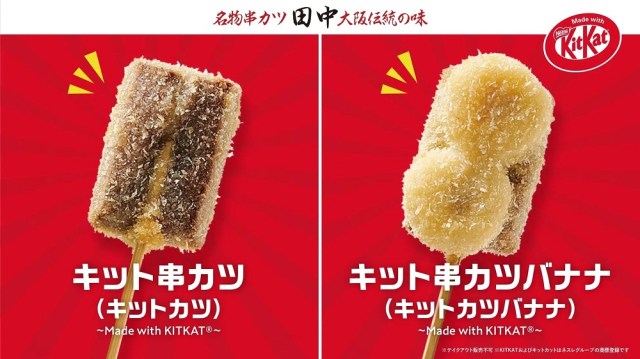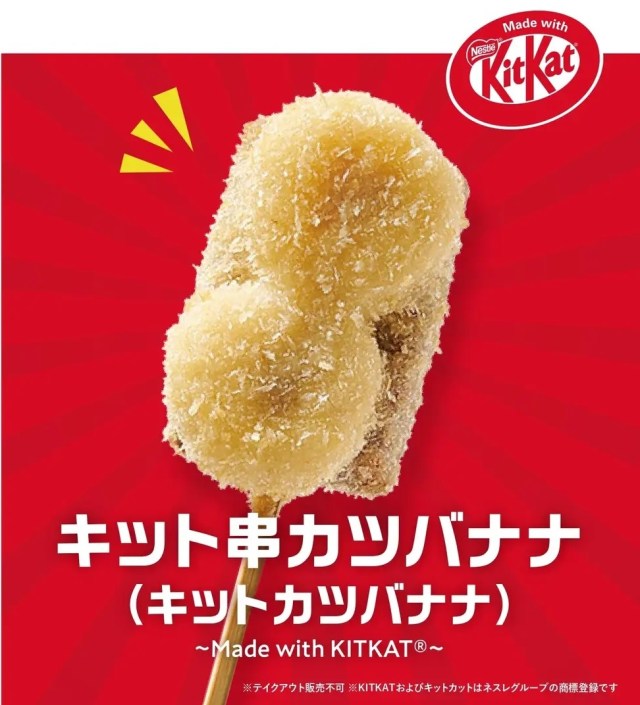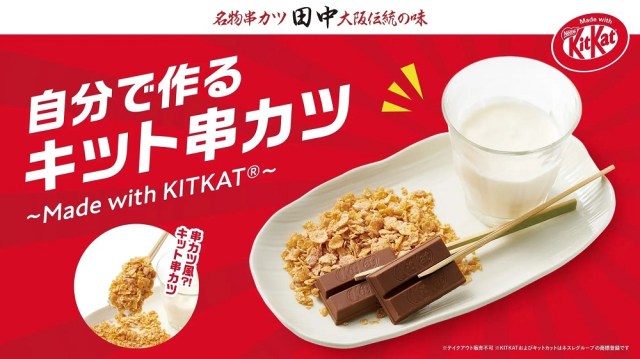
Sweet, savory, and doubly lucky.
There’s no country on earth that loves KitKats quite like Japan. All of those amazing seasonal and regional-exclusive KitKat flavors, though, didn’t come about until after the standard KitKat’s big break in Japan, which it owes to a pun.
In Japanese, KitKat gets pronounced “Kitto Katto,” which sounds very close to the Japanese words kitto (“I think” or “I believe”) and katsu (“win” or “succeed”). When people noticed the similarity, they started gifting or carrying a pack of KitKats in their bag on important days, like entrance exams or job interviews, as a “I believe you/I will succeed” good-luck charm, making the chocolate wafers a symbol of hope, friendship, and emotional support.
But if you spend a lot of time thinking about Japanese food and Japanese linguistics, you might be ready to point out that katsu is also the Japanese word for deep-fried cutlets, which is why Japan is now getting deep-fried KitKats.
In hindsight, it seems like KitKat katsu are something that should have happened years ago. Better late than never, though, especially when fried foods and sweets are involved, and we can thank restaurant chain Kushi Katsu Tanaka for finally realizing the need to make this dessert a reality.
Kushi katsu, Tanaka’s marque menu item, are deep-fried morsels served on a skewer. It’s a broad culinary style adaptable to all sorts of meats, seafood, and vegetables. Dessert kushi katsu are much rarer, though not completely unheard of, but deep-fried KitKats are a bold new step for the kushi katsu culinary sphere.
Tanaka isn’t going into this timidly, either, as they’re offering three different kushi katsu KitKats. There’s the basic Kitto Kushi Katsu, pictured above, with two of the chocolate wafer sticks fried up for 150 yen (US$1). If you’re feeling fancy, there’s also the 170-yen Kitto Kushi Katsu Banana, which adds slices of banana as a pre-frying topping to the KitKat.
And for do-it-yourself-types, there’s the Make Your Own Kitto Kushi Katsu, a 290-yen set of two KitKat skewers and a cup of yogurt sauce to dip them in so you can then coat them in corn flakes, which are a popular ingredient in Japanese parfaits.
▼ With yogurt and cereal, you might even be able to convince yourself that this is a pretty sensible breakfast.
By the way, if you’re wondering if the good-luck properties associated with KitKat because it sounds like katsu are applied to the food that’s actually called katsu too, they are, and cutlets are also a popular meal choice for Japanese people on important days. So by that logic, eating these KitKat katsu should be doubly auspicious, and we should all probably try to consume as many as we can while they’re on the Kushi Katsu Tanaka menu from November 1 to 30.
Source: PR Times via IT Media
Images: PR Times
● Want to hear about SoraNews24’s latest articles as soon as they’re published? Follow us on Facebook and Twitter!




 Deep-fried matcha green tea and strawberry KitKats on a stick coming to Japan
Deep-fried matcha green tea and strawberry KitKats on a stick coming to Japan Japanese KitKats get Japanese anime video from Kyoto Animation director【Video】
Japanese KitKats get Japanese anime video from Kyoto Animation director【Video】 Japanese KitKat gets a new look as a lucky Pizza Hut Melt in Japan
Japanese KitKat gets a new look as a lucky Pizza Hut Melt in Japan Japanese KitKats swap plastic bags for paper packaging with new origami feature
Japanese KitKats swap plastic bags for paper packaging with new origami feature Japanese KitKats up the frisson of excitement with their limited, premium “Blindfold Chocolatory” line
Japanese KitKats up the frisson of excitement with their limited, premium “Blindfold Chocolatory” line Highest Starbucks in Japan set to open this spring in the Tokyo sky
Highest Starbucks in Japan set to open this spring in the Tokyo sky Survey finds that one in five high schoolers don’t know who music legend Masaharu Fukuyama is
Survey finds that one in five high schoolers don’t know who music legend Masaharu Fukuyama is “Let’s Speak North Korean!”
“Let’s Speak North Korean!” Japanese Prime Minister once criticized deploying military to fight Godzilla
Japanese Prime Minister once criticized deploying military to fight Godzilla Foreign tourists in Japan will get free Shinkansen tickets to promote regional tourism
Foreign tourists in Japan will get free Shinkansen tickets to promote regional tourism Saitama is home to the best strawberries in Japan that you’ve probably never even heard of
Saitama is home to the best strawberries in Japan that you’ve probably never even heard of Anime holy ground – A visit to the real-world location of Look Back【Photos】
Anime holy ground – A visit to the real-world location of Look Back【Photos】 Support Japan’s real-world Totoro Forest with special Studio Ghibli collection
Support Japan’s real-world Totoro Forest with special Studio Ghibli collection Tokyo Skytree turns pink for the cherry blossom season
Tokyo Skytree turns pink for the cherry blossom season Mr. Sato taste tests not only the original takoyaki, but its predecessor, radioyaki, in Osaka
Mr. Sato taste tests not only the original takoyaki, but its predecessor, radioyaki, in Osaka The 10 most annoying things foreign tourists do on Japanese trains, according to locals
The 10 most annoying things foreign tourists do on Japanese trains, according to locals Starbucks Japan releases new sakura goods and drinkware for cherry blossom season 2026
Starbucks Japan releases new sakura goods and drinkware for cherry blossom season 2026 Naruto and Converse team up for new line of shinobi sneakers[Photos]
Naruto and Converse team up for new line of shinobi sneakers[Photos] Is Sapporio’s Snow Festival awesome enough to be worth visiting even if you hate the snow? [Pics]
Is Sapporio’s Snow Festival awesome enough to be worth visiting even if you hate the snow? [Pics] Japan has trams that say “sorry” while they ride around town…but why?
Japan has trams that say “sorry” while they ride around town…but why? Sakura Totoro is here to get spring started early with adorable pouches and plushies
Sakura Totoro is here to get spring started early with adorable pouches and plushies Poop is in full bloom at the Unko Museums for cherry blossom season
Poop is in full bloom at the Unko Museums for cherry blossom season Shibuya Station’s Hachiko Gate and Yamanote Line stairway locations change next month
Shibuya Station’s Hachiko Gate and Yamanote Line stairway locations change next month Japan’s new “Cunte” contact lenses aren’t pronounced like you’re probably thinking they are
Japan’s new “Cunte” contact lenses aren’t pronounced like you’re probably thinking they are Japan’s newest Shinkansen has no seats…or passengers [Video]
Japan’s newest Shinkansen has no seats…or passengers [Video] Foreigners accounting for over 80 percent of off-course skiers needing rescue in Japan’s Hokkaido
Foreigners accounting for over 80 percent of off-course skiers needing rescue in Japan’s Hokkaido Super-salty pizza sends six kids to the hospital in Japan, linguistics blamed
Super-salty pizza sends six kids to the hospital in Japan, linguistics blamed Starbucks Japan unveils new sakura Frappuccino for cherry blossom season 2026
Starbucks Japan unveils new sakura Frappuccino for cherry blossom season 2026 Take a trip to Japan’s Dododo Land, the most irritating place on Earth
Take a trip to Japan’s Dododo Land, the most irritating place on Earth Is China’s don’t-go-to-Japan warning affecting the lines at a popular Tokyo gyukatsu restaurant?
Is China’s don’t-go-to-Japan warning affecting the lines at a popular Tokyo gyukatsu restaurant? Survey asks foreign tourists what bothered them in Japan, more than half gave same answer
Survey asks foreign tourists what bothered them in Japan, more than half gave same answer Japan’s human washing machines will go on sale to general public, demos to be held in Tokyo
Japan’s human washing machines will go on sale to general public, demos to be held in Tokyo Starbucks Japan releases new drinkware and goods for Valentine’s Day
Starbucks Japan releases new drinkware and goods for Valentine’s Day We deeply regret going into this tunnel on our walk in the mountains of Japan
We deeply regret going into this tunnel on our walk in the mountains of Japan Studio Ghibli releases Kodama forest spirits from Princess Mononoke to light up your home
Studio Ghibli releases Kodama forest spirits from Princess Mononoke to light up your home Major Japanese hotel chain says reservations via overseas booking sites may not be valid
Major Japanese hotel chain says reservations via overseas booking sites may not be valid Put sesame oil in your coffee? Japanese maker says it’s the best way to start your day【Taste test】
Put sesame oil in your coffee? Japanese maker says it’s the best way to start your day【Taste test】 No more using real katana for tourism activities, Japan’s National Police Agency says
No more using real katana for tourism activities, Japan’s National Police Agency says Nestlé will release the ultimate perfected KitKat in honor of its 50th anniversary in Japan
Nestlé will release the ultimate perfected KitKat in honor of its 50th anniversary in Japan New Japanese KitKat flavours include sakura and pineapple candy
New Japanese KitKat flavours include sakura and pineapple candy Yoghurt Sake is the newest Japanese KitKat we need to get our hands on right now
Yoghurt Sake is the newest Japanese KitKat we need to get our hands on right now New Japanese KitKat flavour lets you eat a zunda milkshake
New Japanese KitKat flavour lets you eat a zunda milkshake New Japanese KitKat is…a Heartful Bear!
New Japanese KitKat is…a Heartful Bear! Ruby chocolate KitKats come to Japanese convenience stores with new Everyday Nuts and Cranberry
Ruby chocolate KitKats come to Japanese convenience stores with new Everyday Nuts and Cranberry Japanese KitKat Bears debut exclusively in Japan, but are they any good?
Japanese KitKat Bears debut exclusively in Japan, but are they any good? Mr. Sato takes a break in the new Shibuya KitKat Chocolatory, has a custom KitKat
Mr. Sato takes a break in the new Shibuya KitKat Chocolatory, has a custom KitKat New Japanese KitKats combine ruby chocolate with everyday nuts and cranberry
New Japanese KitKats combine ruby chocolate with everyday nuts and cranberry World’s first make-your-own KitKat shop is opening in Tokyo
World’s first make-your-own KitKat shop is opening in Tokyo New Japanese KitKats capture the flavour of a busy port city
New Japanese KitKats capture the flavour of a busy port city KitKat releases new Japanese plum flavor to celebrate Japan’s most beautiful winter flowers
KitKat releases new Japanese plum flavor to celebrate Japan’s most beautiful winter flowers Japanese KitKats now come in edamame milkshake flavour
Japanese KitKats now come in edamame milkshake flavour New winter-only Japanese KitKat flavour combines chocolate with a decadent sweet
New winter-only Japanese KitKat flavour combines chocolate with a decadent sweet New Doughnut KitKat captures the flavour of a Japanese castle town
New Doughnut KitKat captures the flavour of a Japanese castle town